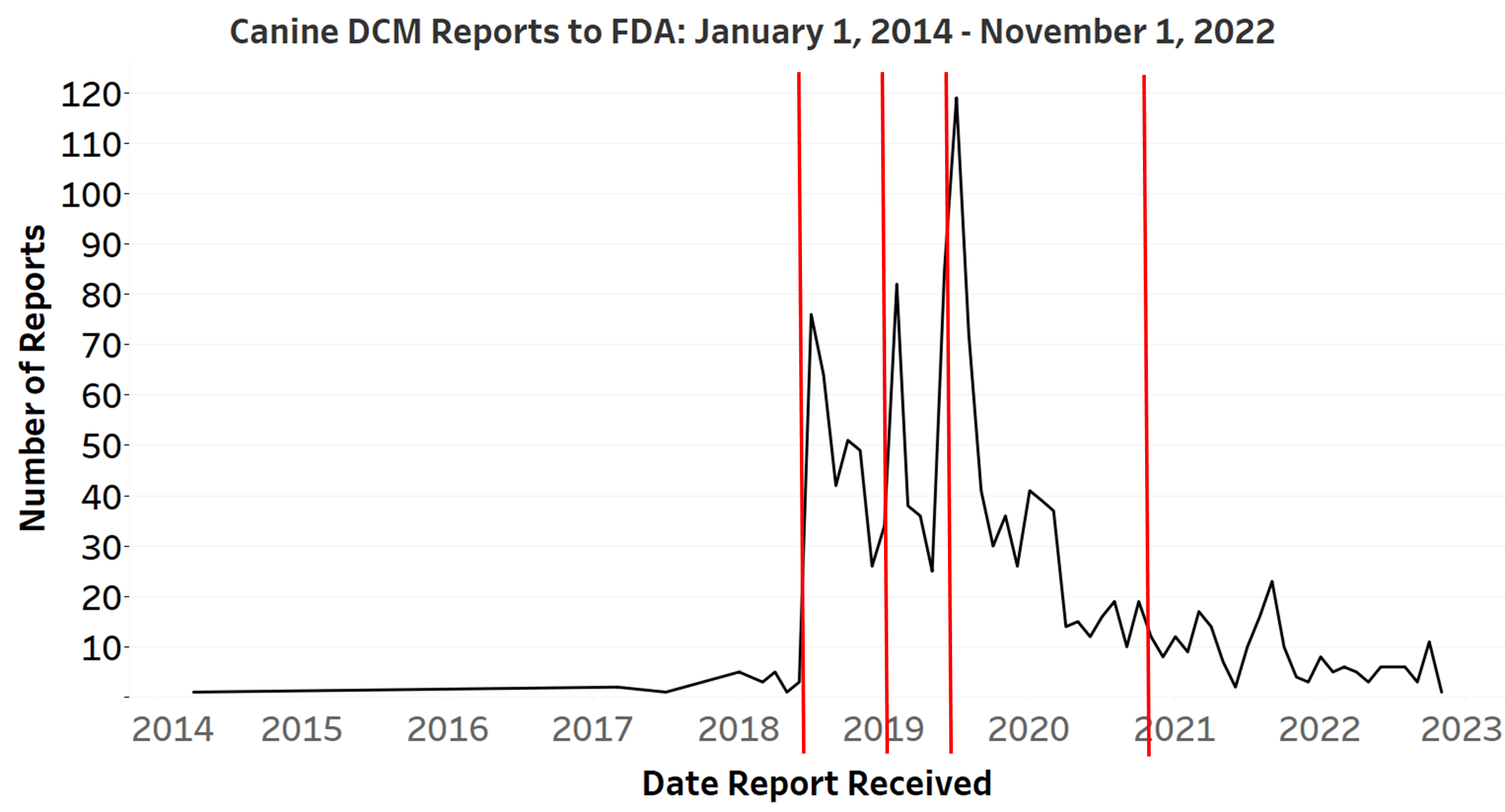Questions & Answers: FDA’s Work on Potential Causes of Non-Hereditary DCM in Dogs
Español
In September 2020, FDA joined scientific experts from academia, industry, and veterinary medicine in a scientific forum hosted by Kansas State University External Link Disclaimer to examine the potential causes of non-hereditary dilated cardiomyopathy (DCM) in dogs. The event was a forum where scientists with research into DCM could share information, collaborate, and discuss many different – and even conflicting – theories on the condition. FDA; the veterinary community, especially veterinary nutritionists and veterinary cardiologists and other specialists; industry and academia, continue to examine this issue to help determine what factors may be contributing to the heart conditions observed and reported to FDA.
Because every dog is unique and has their own nutritional needs, your veterinarian is in the best position to advise you on how to best feed your dog. Please consult your veterinarian to discuss before making a change in your dog’s diet. We encourage veterinarians to review the KSU proceedings External Link Disclaimer to learn more about the current research on this issue.
We recognize that you may have questions. Below we have compiled answers to address some of the frequently asked questions raised by pet owners and veterinarians. These may be updated as we learn more.
1. What is canine dilated cardiomyopathy (DCM) and how does non-hereditary DCM differ from the genetic form?
DCM is a disease of a dog’s heart muscle and results in an enlarged heart. As the heart and its chambers become dilated, it becomes harder for the heart to pump, and heart valves may leak, which can lead to a buildup of fluids in the chest and abdomen (congestive heart failure).
Historically, DCM has been primarily linked to a genetic predisposition in certain breeds, but emerging science appears to indicate that non-hereditary forms of DCM occur in dogs as a complex medical condition that may be affected by the interplay of multiple factors such as genetics, underlying medical conditions, and diet. Aspects of diet that may interact with genetics and underlying medical conditions may include nutritional makeup of the ingredients and how dogs digest them, ingredient sourcing, processing, formulation, and/or feeding practices.
Reports from veterinary cardiologists demonstrate some good results in improving heart function in non-hereditary DCM cases, unlike genetic forms of DCM, with appropriate veterinary treatment and dietary modification, when caught early in the progression of the disease.
2. Why is FDA focused on potential dietary causes of non-hereditary DCM?
While non-hereditary DCM appears to be caused by a confluence of multiple factors, FDA is a regulatory agency and has regulatory authority over animal food, including pet food, thus the reason for the agency’s focus on diet as a potential contributor. There is no public health agency that tracks animal health in the same way that the Centers for Disease Control and Prevention tracks human health, therefore FDA has called on the veterinary and academic communities, as well as industry, to contribute research on various aspects of non-hereditary DCM. Many representatives from these sectors participated in the recent KSU scientific forum and several agreed to publicly share their abstracts and/or presentations.
3. What is FDA doing to better understand non-hereditary DCM cases?
Our veterinarians, animal nutritionists, epidemiologists and pathologists have been working with veterinary cardiologists and nutritionists from academia, industry and private practice to better understand the clinical presentation of the cases and potential ties to diet, such as bioavailability of critical nutrients and how well a dog digests these nutrients. FDA scientists also presented External Link Disclaimer at the KSU symposium on a subset of dogs that had fully or partially recovered from DCM with diet change and veterinary care.
4. What additional information would help further understanding of non-hereditary DCM?
FDA is encouraged by the response of veterinary cardiologists, veterinary nutritionists, academia and industry in delving into this issue and we encourage other scientists to take part. As we look further into the role that diet may play in these cases, we hope to explore additional avenues of inquiry such as formulation, nutrient bioavailability, ingredient sourcing, and diet processing to determine if there are any common factors. We have asked pet food manufacturers to share diet formulation information, which could substantially benefit our understanding of the role of diet in the development of non-hereditary DCM. Formulation data shared with the FDA will be kept confidential.
5. How many reports of DCM has FDA received?
Since the agency’s last public communication External Link Disclaimer on the investigation in 2020, FDA continues to receive reports of DCM diagnoses in dogs, but at lower levels than experienced from 2018 through 2020 (see figure and table below). Some of the reports involve more than one individual animal from a single household. While FDA has followed up on a subset of these reports, the agency is unable to investigate every report to verify or confirm the reported information.
Over time, FDA has published information about the number of reports the agency has received. These communications have varied in their content – sometimes including cats, as well as dogs, or only including those reports that FDA had confirmed with records from a veterinary cardiologist. In December 2022 as part of a routine update to Congress, FDA compiled information on canine DCM reports submitted to the agency. FDA has opted to share that information here for public awareness.
The graph shows the number of reports submitted to FDA since 2014 and indicates the dates on which FDA issued public updates on the investigation. The table that follows shows the number of reports of DCM in dogs submitted between previous public communications from FDA, up to November 1, 2022.
Number of reports submitted to FDA of DCM in dogs*†
| Jan. 1, 2014 – Nov 30, 2018 |
Dec 1, 2018 – Apr 30, 2019 |
May 1, 2019 – July 31, 2020 |
Aug 1, 2020 – Nov 1, 2022 |
Total:
Jan 1, 2014 – Nov 1, 2022 |
| 329 |
190 |
608 |
255 |
1,382 |
*While many of the reports submitted to FDA include extensive clinical information, including echocardiogram results, cardiology/veterinary records, and detailed diet histories, the report counts are not limited to those with extensive records and include all reports in which one or more dogs was simply stated to have been diagnosed with DCM. FDA has followed up on a subset of these reports, but is unable to investigate every report to verify or confirm the reported information. FDA did not include in the many general cardiac reports submitted to FDA that did not report a DCM diagnosis.
†It is typical for FDA to receive a short-term increase in reports after issuing public updates on a pet health issue. In this case, upticks in the number of DCM reports to FDA tend to happen after FDA issues public updates on the DCM issue. Public updates are indicated by the lines in the graph above.
In human illness investigations, FDA works in concert with the Centers for Disease Control and Prevention (CDC) and state boards of health, which collect and track cases of foodborne illness. Unfortunately, there is no equivalent for pets, which means that it is difficult to accurately evaluate the scope of an animal disease. For instance, FDA is unaware of any statistics on the background rate of non-hereditary DCM in dogs. Reports to FDA are voluntary and likely do not reflect the true incidence of the disease in the population.
FDA continues to encourage research and collaboration by academia, veterinarians, and industry. FDA reviews all reports received as part of our ongoing surveillance efforts related to pet food safety. However, due to resource constraints the agency is not able to follow up or provide updates on each report.
6. Do the diets associated with cases of non-hereditary DCM appear to have any commonalities?
Most of the diets associated with the reports of non-hereditary DCM have legume seed ingredients, also called “pulses” (e.g., peas, lentils, etc.), high in their ingredient lists (although soy is a legume, we did not see a signal associated with this ingredient). These include both “grain-free” and grain-containing formulations. Legumes, including pulse ingredients, have been used in pet foods for many years, with no evidence to indicate they are inherently dangerous, but analysis of data reported to CVM indicates that pulse ingredients are used in many “grain-free” diets in greater proportion than in most grain-containing formulas. FDA has asked pet food manufacturers to provide diet formulations so we can further understand the proportions of ingredients in commercially-available diets and possible relationships with non-hereditary DCM.
The FDA does not know the specific connection between these diets and cases of non-hereditary DCM and is continuing to explore the role of genetics, underlying medical conditions, and/or other factors.
7. Is FDA planning to continue naming the brands most associated with cases?
No, we are not planning to update the commonly reported brands, as we are aware that several pet food companies have adjusted diet formulations since our initial announcements about DCM. We have asked pet food manufacturers to share diet formulation information, which could substantially benefit our understanding of the role of diet in these cases. We continue to encourage pet owners to discuss their animals' diets with their veterinarians.
8. Is this an issue with only grain-free diets or diets containing legumes or pulses?
No. FDA has received reports of non-hereditary DCM associated with both grain-free and grain-containing diets. Most of the diets associated with reports of non-hereditary DCM have non-soy legumes and pulses (e.g., peas, lentils, etc.) high in their ingredient lists. However, it is important to note that legumes and pulses have been used in pet foods for many years, with no evidence to indicate they are inherently dangerous. CVM’s data show that pulse ingredients are likely used in many “grain-free” diets in greater proportion than in most grain-containing formulas.
9. As a regulatory agency, has FDA requested any recalls of pet foods associated with non-hereditary DCM?
FDA has no definitive information indicating that the diets are inherently unsafe and need to be removed from the market, but we are continuing to work with stakeholders in assessing how the diets may interact with other factors that may be impacting non-hereditary DCM. We encourage pet owners to work with their veterinarians, who may consult with a board-certified veterinary nutritionist, prior to making diet changes. We also encourage veterinarians to review the proceedings of the KSU symposium in order to learn more about non-hereditary DCM. FDA continues to pursue scientific understanding of non-hereditary DCM and welcomes additional contributions from other scientists.
10. How long will it take to pinpoint the cause(s) of non-hereditary DCM?
We see this as an ongoing, collaborative scientific venture, of which FDA has just one piece as the regulator of animal food and reviewer of adverse event reports received as part of the pet food early warning and surveillance system. The scientific community continues to assess the available information and fill data gaps to determine what factors may contribute to the development of non-hereditary DCM. We look forward to continuing to engage with scientists as opportunities arise. We will also provide additional updates to notify the public if or when substantive scientific information comes to light.
Additional Information
Questions & Answers: FDA Center for Veterinary Medicine’s Investigation into a Possible Connection Between Diet and Canine Heart Disease (updated June 27, 2019)
| 

